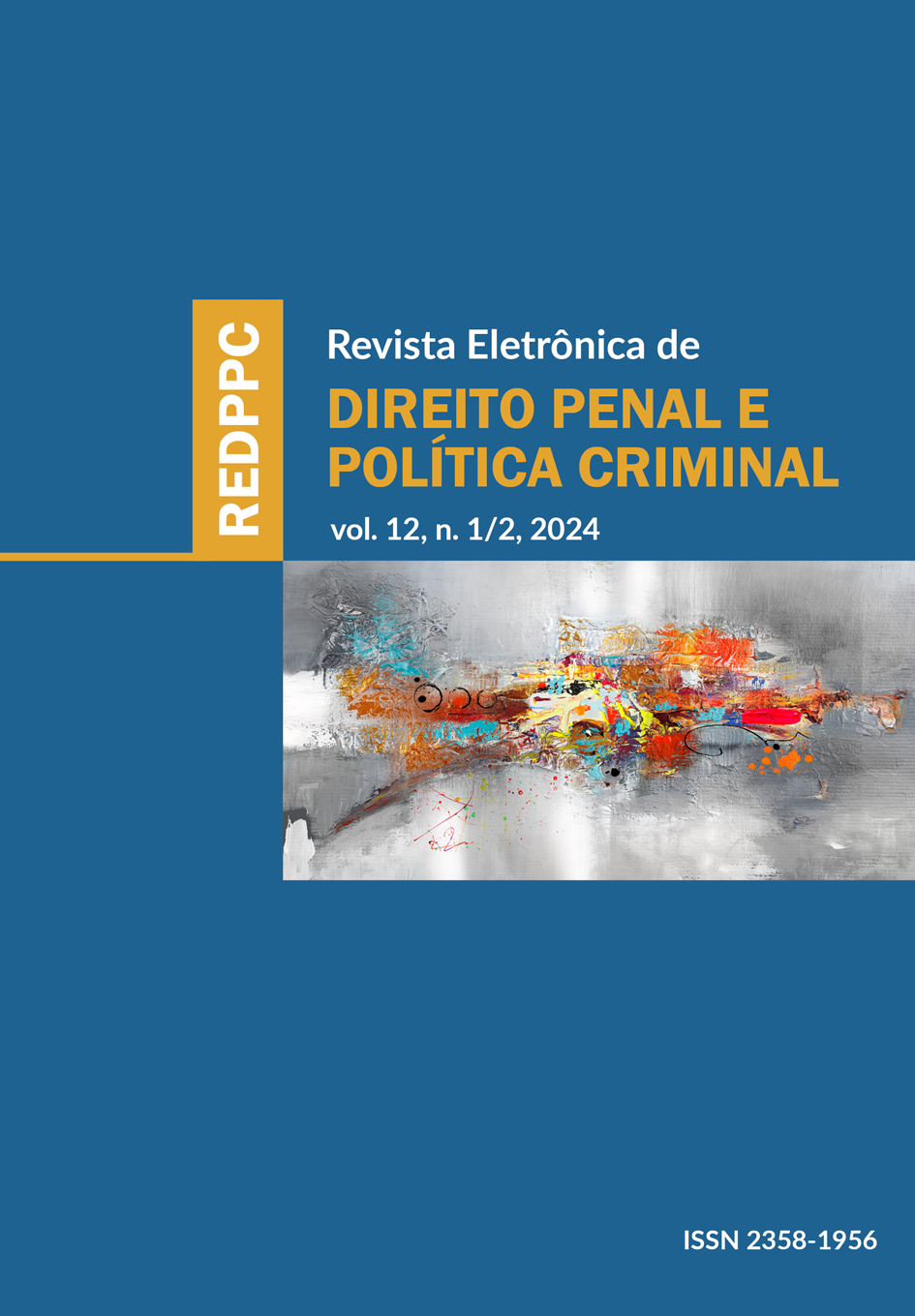A criminalidade à luz da obra de Eric Voegelin
Um olhar para além dos três paradigmas criminológicos
Abstract
This article aims to analyze the issue of criminality from the perspective of philosopher and political scientist Eric Voegelin. Criminological approaches tend to revolve around two paradigms: the first approach focuses primarily on the author of a particular criminal act, inquiring into the reasons or conditions that led to such behavior, and the second approach shifts its focus to society and its control instances. A third criminological approach, seeking to juxtapose the previous two, has been termed the ‘social interrelations paradigm’. However, in the wake of Voegelin's thought, it is possible to discern a yet different approach, which involves a renewed perspective that does not focus on the individual, the collective, or control instances, but instead follows the Platonic concept of metaxy, considering criminality as a matter related to culture and civilization, or more precisely, to the lack of adequate symbolization by a civilization of the transcendent values that structure it. It is suggested that it is possible to analyze the problem of criminality from a field historically neglected by criminological studies, from Lombroso to the so-called Critical Criminology: the investigation of the presence or absence, in any given society, of a symbolic structure referenced to transcendence.
Downloads
References
AGOSTINHO. Confissões. Trad. Maria Luiza Jardim Amarante. 14ª ed. São Paulo: Paulus, 1984.
BATISTA, Vera Malaguti. Introdução Crítica à Criminologia Brasileira. Rio de Janeiro: Revan, 2011.
CAVANAUGH, William T. Beyond Secular Parodies. In: MILLBANK, John; PICKSTOCK, Catherine; WARD, Graham. Radical Orthodoxy: a new theology. London and New York: Routledge, 1999.
COMPARATO, Fabio Konder. Ética: direito, moral e religião no mundo moderno. 2ª ed. São Paulo: Companhia das Letras, 2006.
DOUGLASS, Bruce. A Diminished Gospel: a critique of Voegelin’s interpretation of Christianity. In: MCKNIGHT, Stephen. Eric Voegelin’s Search for Order in History. Baton Rouge: Louisiana State University Press, 1978.
ECCEL, Daiane. Eric Voegelin e o gnosticismo: da estreita relação entre religião, política e os regimes totalitários. In: Numen: revista de estudos e pesquisa da religião, Juiz de Fora, v. 18, n. 2, 2016.
ELIOT, T. S. Notas para uma definição de cultura. Trad. Geraldo Gerson de Souza. São Paulo: Perspectiva, 2013.
ESPOSITO, Roberto. Communitas: origem e destino da comunidade. Belo Horizonte: UFMG, 2022.
FACÇÃO criminosa PCC foi criada em 1993. Folha de S. Paulo, São Paulo, 14 de mai. 2006. Disponível em: <https://www1.folha.uol.com.br/folha/cotidiano/ult95u121460.shtml>. Acesso: 13 fev. 2023.
FEDERICI, Michael P. Eric Voegelin: a restauração da ordem. Trad. Elpídio M. Dantas Fonseca. São Paulo: É Realizações, 2011.
GALVÃO DE SOUSA, José Pedro. Apresentação. In: VOEGELIN, Eric. A Nova Ciência da Política. 2ª ed. Trad. José Viegas Filho. Brasília: Editora Universidade de Brasília, 1982, p. 8.
HENRIQUES, Mendo Castro. Eric Voegelin's History of political ideas. The bones of contention of the political animal. In: RUDN Journal of Philosophy. Vol. 24, n. 01, 2020 (pp. 99-112).
JONAS, Hans. The Gnostic Religion. Boston: Bacon Press, 1958.
JUNG, Carl Gustav. “Sete Sermões aos Mortos”. In: Memórias, Sonhos, Reflexões. Org. Aniela Jaffé. Trad. Dora Ferreira da Silva. 13ª. ed. Rio de Janeiro: Nova Fronteira, 2006.
LUBAC, Henri de. O Drama do Humanismo Ateu. Trad. Lyege Ornellas Pires Carvalho. Itapevi: Nebli, 2016, pp. 60-61
PIRES, Alvaro. La criminologie et ses objets paradoxaux : réflexions épistémologiques sur un nouveau paradigme. In: Revue Déviance et Société, 17(2), 1993.
REALE, Giovanni. Para uma nova interpretação de Platão. Trad. Marcelo Perine. 2ª Ed. São Paulo: Loyola, 2004.
SÁ, Alvino Augusto de. Criminologia Clínica e Execução Penal. São Paulo: Revista dos Tribunais, 2011.
VOEGELIN, Eric. Equivalences of Experience and Symbolization in History. In: The Collected Works of Eric Voegelin. Vol. 12 (Published Essays, 1966-1985). Baton Rouge: Louisiana State University Press, 1990.
_______. History of Political Ideas: Vol. 2. The Middle Ages to Aquinas. Columbia: University of Missouri Press, 1998.
_______. Order and History: Vol. 1: Israel and Revelation. Colombia, Mo.: University of Missouri Press, 2001.
_______. Order and History: Vol. 2: The World of the Polis. Colombia, Mo.: University of Missouri Press, 2000a.
_______. Order and History: Vol. 3: Plato and Aristotle. Colombia, Mo.: University of Missouri Press, 2000b.
_______. Ordem e História: Vol. 5. Em Busca da Ordem. Trad. Luciana Pudenzi. São Paulo: Loyola, 2010.
_______. Science, Politics, and Gnosticism. In: The Collected Works of Eric Voegelin. Vol. 5 (Modernity without Restraint). Columbia and London: University of Missouri Press, 2000c.
_______. The New Science of Politics. In: The Collected Works of Eric Voegelin. Vol. 5 (Modernity without Restraint). Columbia and London: University of Missouri Press, 2000d.
_______. The Political Religions. In: The Collected Works of Eric Voegelin. Vol. 5 (Modernity without Restraint). Columbia and London: University of Missouri Press, 2000e.
_______. Reflexões Autobiográficas. Trad. Maria Inês de Carvalho. São Paulo: É Realizações, 2007.
Downloads
Published
How to Cite
Issue
Section
License
Copyright (c) 2024 Revista Eletrônica de Direito Penal e Política Criminal

This work is licensed under a Creative Commons Attribution-NonCommercial-NoDerivatives 4.0 International License.
The opinions expressed by the authors of the articles are their exclusive responsibility, and do not necessarily represent the thinking of the Electronic Journal of Criminal Law and Policy, its Editors and Scientific Board. The published works become property of REDPPC Journal.




